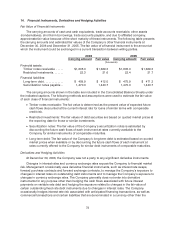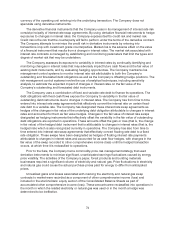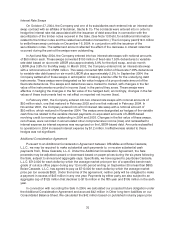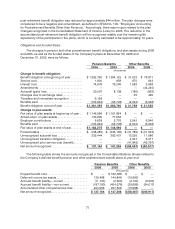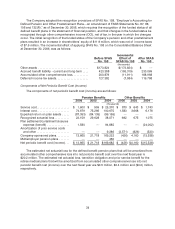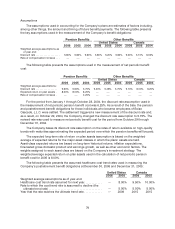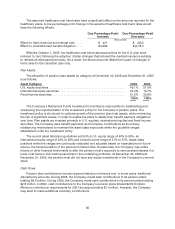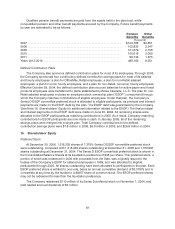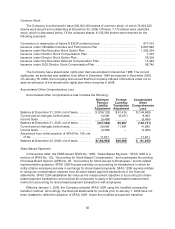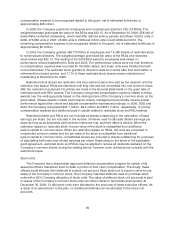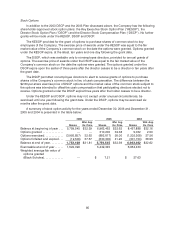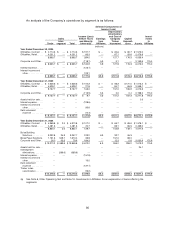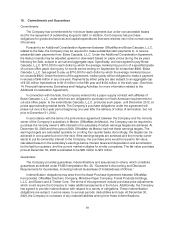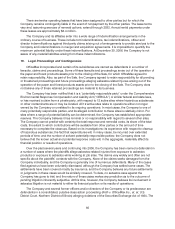OfficeMax 2006 Annual Report Download - page 87
Download and view the complete annual report
Please find page 87 of the 2006 OfficeMax annual report below. You can navigate through the pages in the report by either clicking on the pages listed below, or by using the keyword search tool below to find specific information within the annual report.83
method, the Company must record compensation expense for all awards granted after the adoption
date and for the unvested portion of previously granted awards that remain outstanding at the
adoption date, under the fair value method.Previously, the Company recognized compensation
expense for share-based awards to employees using the fair-value-based guidance in SFAS 123. Due
to the fact that the Company had previously accounted for share-based awards using SFAS 123,the
adoption of SFAS 123R did not have a material impact onthe Company’s financial position, results of
operations or cash flows.
The Company sponsors several share-based compensation plans, which are described below.
Compensation costs related to the Company’s share-based plans were $24.7 million, $10.0 million
and $25.1 million for 2006, 2005 and 2004, respectively. Compensationexpense is generally
recognizedon a straight-linebasis over the vesting period of grants. The total income tax benefit
recognized in the income statement for share-based compensation arrangements was $9.6 million for
2006,$3.9 million for 2005 and $9.8 million for 2004.
2003 Director Stock Compensation Plan and OfficeMax Incentive and Performance Plan
In February 2003, the Company’s Board of Directors adopted the 2003 Director Stock
Compensation Plan (the “2003 DSCP”) and the 2003 OfficeMax Incentive and Performance Plan (the
“2003Plan”), formerly named the2003Boise Incentive and Performance Plan, which were approved
by shareholders in April 2003.
A total of 58,740 shares of common stockare reserved for issuance under the 2003 DSCP. Prior
to December 8,2005, the 2003DSCP permitted non-employee directorsto elect to receive some or all
of their annual retainer and meeting fees in the form of optionsto purchase shares of theCompany’s
common stock. Non-employeedirectorswho elected to receive aportion of their compensationin the
form of stock options did not receive cash for that portion of their compensation. The difference
between the $2.50-per-share exercise price of the options and the market value of the common stock
on the dateof grant was equal to the cash compensation that participating directors elected to forego
and was recognized as compensation expense in theConsolidated Statements of Income (Loss).On
December 8, 2005, the Board of Directors amended the 2003 DSCP to eliminate the choice to receive
discounted stock options. All options granted underthe 2003DSCP expire three years after the holder
ceases to be a director.
The 2003 Plan was effective January 1, 2003, and replaced the Key Executive Performance Plan
for ExecutiveOfficers, Key Executive Performance Plan for Key Executives/Key Managers, 1984 Key
Executive Stock Option Plan (“KESOP”), Key Executive Performance Unit Plan (“KEPUP”) and
Director Stock OptionPlan (“DSOP”). No further grants or awards have been made under the Key
Executive Performance Plans, KESOP, KEPUP, or DSOP since 2003. A total of 5,657,893 shares of
common stock is reserved for issuance under the 2003 Plan. The Company’s executive officers, key
employees andnonemployee directors areeligible to receive awards under the 2003 Plan at the
discretion of the Executive Compensation Committee of the Board of Directors. Eight types ofawards
may be granted under the 2003 Plan, including stock options, stock appreciation rights, restricted
stock, restricted stock units, performance units, performanceshares, annual incentive awards and
stock bonus awards.
Restricted Stock and Restricted Stock Units
In 2006, theCompany granted to employees and nonemployee directors 1,157,479 restricted
stock units (“RSUs”). The weighted-average grant-date fair valueof the RSUs was $28.79. As of
December 30, 2006, 1,100,469 ofthese RSUs remained outstanding,which vest after defined service
periods as follows: 12,159 units in 2007, 544,151 in 2008 and 544,159 in 2009. The remaining


